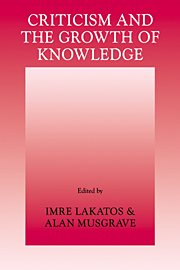 Criticism and the Growth of Knowledge
Criticism and the Growth of Knowledge Published online by Cambridge University Press: 05 August 2014
Professor T. S. Kuhn's contribution to this Symposium can be looked at from two angles: either as a critique of Sir Karl Popper's approach towards the philosophy of science, in the light of its contrasts with Professor Kuhn's own views, or alternatively, as a further instalment in the development of Kuhn's analysis of the process of scientific change. My concern here is with the second of these two aspects. I shall draw attention to certain significant changes in the position Kuhn now appears to be occupying from those which he adopted, first in his original paper on ‘The Function of Dogma in Scientific Research’ read at Worcester College, Oxford, in 1961, and subsequently in his book The Structure of Scientific Revolutions published in 1962. And in the light of changes, I shall suggest how we might see our way beyond Kuhn's theory of ‘scientific revolution’ to a more adequate theory of scientific change.
The great merit of Professor Kuhn's insistence on the ‘revolutionary’ character of some changes in scientific theory is that it has compelled many people to face for the first time the full profundity of the conceptual transformations which have, at times, marked the historical development of scientific ideas. Yet from the beginning it was clear to many onlookers that Kuhn's original statement of his position was, in at least two respects, only provisional. Some of us have been waiting with interest to see in what direction his own intellectual development took him next.
To save this book to your Kindle, first ensure no-reply@cambridge.org is added to your Approved Personal Document E-mail List under your Personal Document Settings on the Manage Your Content and Devices page of your Amazon account. Then enter the ‘name’ part of your Kindle email address below. Find out more about saving to your Kindle.
Note you can select to save to either the @free.kindle.com or @kindle.com variations. ‘@free.kindle.com’ emails are free but can only be saved to your device when it is connected to wi-fi. ‘@kindle.com’ emails can be delivered even when you are not connected to wi-fi, but note that service fees apply.
Find out more about the Kindle Personal Document Service.
To save content items to your account, please confirm that you agree to abide by our usage policies. If this is the first time you use this feature, you will be asked to authorise Cambridge Core to connect with your account. Find out more about saving content to Dropbox.
To save content items to your account, please confirm that you agree to abide by our usage policies. If this is the first time you use this feature, you will be asked to authorise Cambridge Core to connect with your account. Find out more about saving content to Google Drive.